Hilsa brings back smiles to fishers
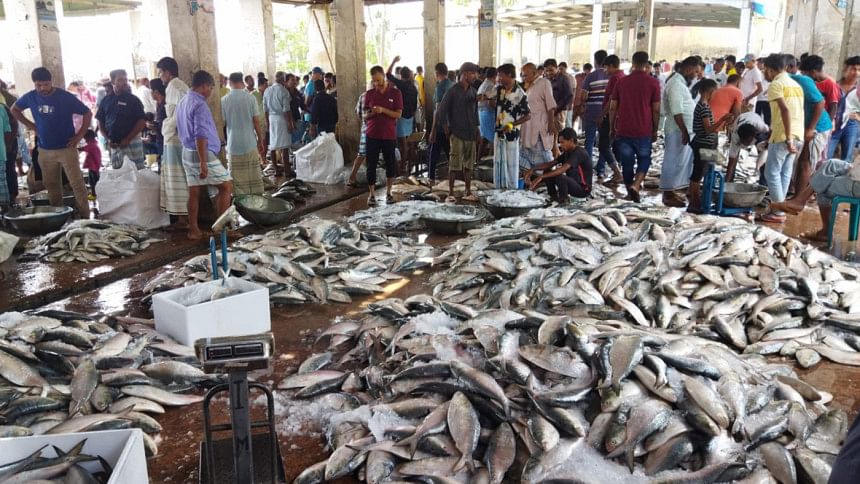
"Only God knows how we survived. First, it was the cyclone, and then came the fishing ban, and then another depression. We could only hope for better days soon. But the wait was too long."
Fazal Ahmed, a fisherman from Kutubdia upazila in Cox's Bazar, was recalling the hard times he and his family had to go through since mid-May.
Not only Fazal, but most of the fishermen in the Chattogram region also sat idle for nearly four months since Cyclone Mocha hit the region in the second week of May.
As the cyclone system passed, after a few days, the government imposed a 65-day ban on fishing in the Bay. And then came another depression that flooded the region, making a voyage to the sea tough.
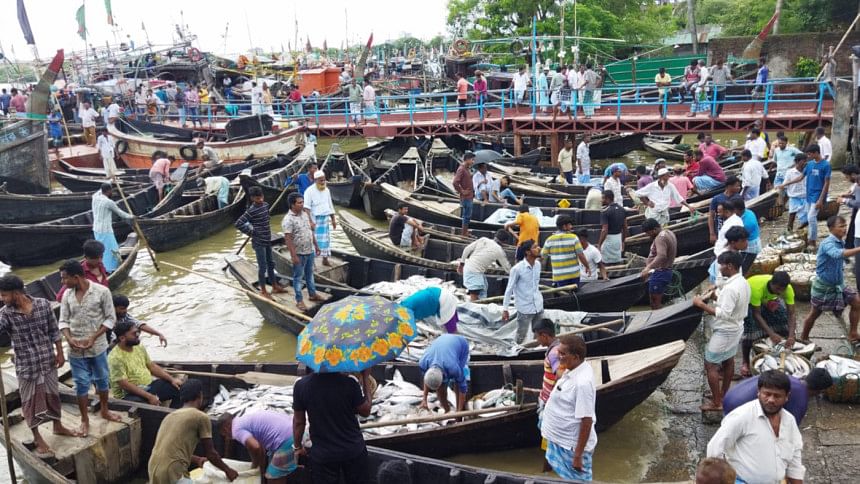
"We got hilsa worth around Tk 3 lakh when we set off for the sea after the ban lifted on July 23 but had to come back within three days because of the depression in the bay. That trip incurred us a loss of Tk 2 lakh," he said.
He said during that period he had to borrow money to meet his family's daily needs. This was the case for the other fishermen as fishing is the only occupation they know to earn their living.
It's been a long time since we got hilsa in such large quantity. If the trend continues, we will be able to repay all of our debts made during the ban period.
Now, that the depression is gone, things are getting better for them.
Fazal's last fishing trip to the sea was a success.
"We were lucky this time. We quickly caught around 7,000 hilsa fish worth around Tk 45 lakh," said a beaming Fazal.
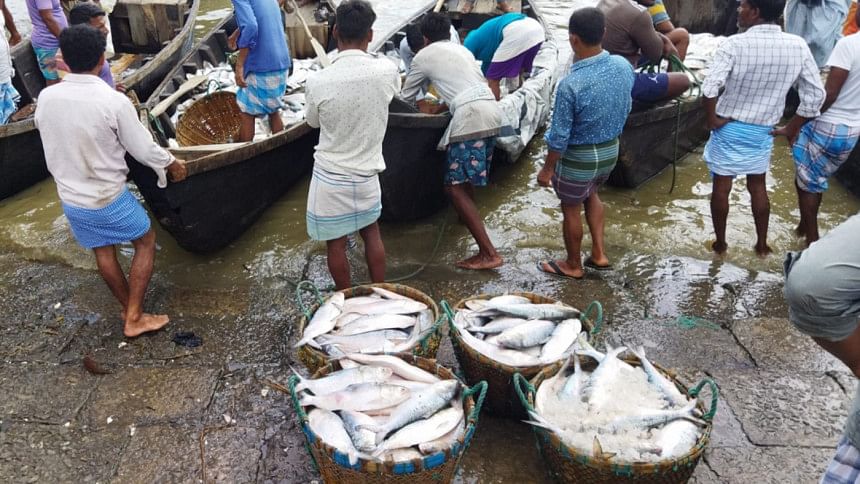
Like him, Shakil and his fellow fishermen in the same area also got 4,000 hilsa and sold them for Tk 35 lakh.
"It's been a long time since we got hilsa in such large quantity. If the trend continues, we will be able to repay all of our debts made during the ban period," he said.
Both fishermen were talking to The Daily Star at Cox's Bazar Fish Landing Station recently.
Rubel Islam, publication secretary of Cox's Bazar Fish Traders' Association, said the market is now being flooded with hilsa, dropping their prices considerably.
However, he said a huge supply sometimes plummets prices, incurring losses for both the fishermen and traders.
Most of the fishing trawlers are getting 2,000 to 10,000 hilsa per trip, he said.
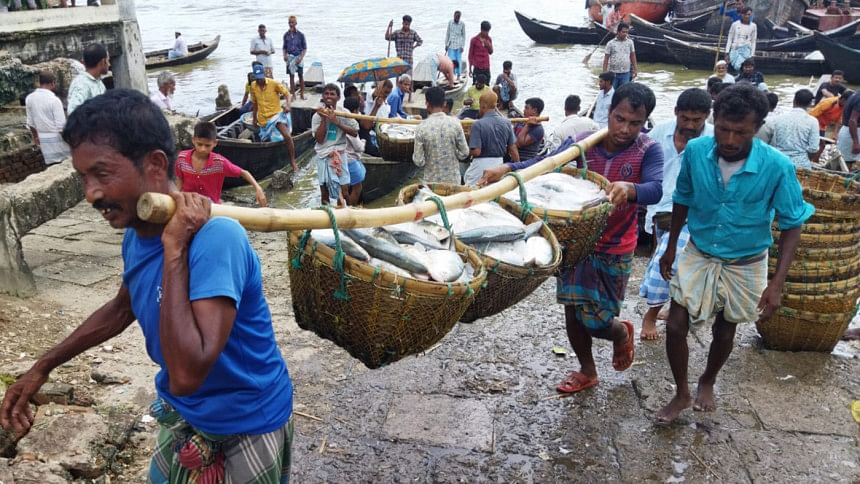
Abdul Khaliq, a fish trader at the landing station yesterday, said they are buying hilsa weighing over 1kg at around Tk 1,150 per piece, while 900g-1kg hilsa is sold at Tk 1,050-1,120 per piece, and below 800g is Tk 800-930.
From the start of the month till yesterday, Cox's Bazar Fish Landing Station received 183.9 tonnes of hilsa. This time last year, a total of 222 tonnes of hilsa were sold at the wholesale market, said Ashish Kumar, accountant of the fish station.
For the last two days, the fish supply has dropped slightly due to the light depression in the bay, he said. Supply will be normal within two or three days, he hoped.
Delwar Hossain, secretary of Cox's Bazar Fishing Trawler Owners' Association, said around 3,500 fishing trawlers from Cox's Bazar are now in the sea for fishing, and they are getting good catches.
However, expressing concerns, he alleged that hundreds of Indian fishing boats were catching fish in Bangladeshi territory near Mohipur and Meghna estuaries. Those boats with advanced fishing mechanisms can catch large quantities of fish. If it is continued, our fishers will likely not get fish in the near future, he said.
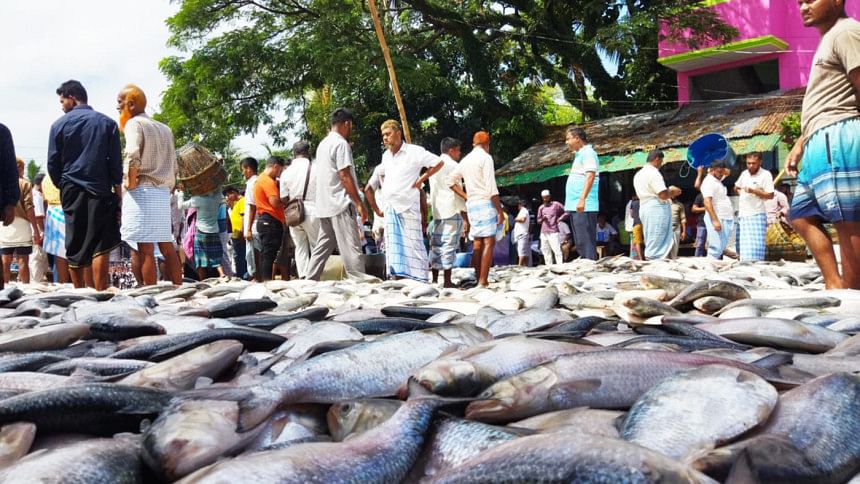
Asked, he blamed the fishers' woes on the impractical and untimely fishing ban.
Delwar said local fishers set their timing for fishing depending on the full moon and new moon.
"We traditionally suspend fishing in the Bangla months of Ashar and Sharban, when the sea becomes rough. But the government officials set the date for the fishing ban following the English calendar (Gregorian calendar), which is piling misery on the fishers and also harmful for fish breeding."
The authority should impose a ban on fishing based on ground realities. The ban came a month earlier than required, he added.
He urged the authorities to consider changing the timing of the fishing ban.
He also alleged that "Around half the names in the government list for compensation during the ban period are not fishermen. So, a large number of fishers are left out of the government food assistance programme."

 For all latest news, follow The Daily Star's Google News channel.
For all latest news, follow The Daily Star's Google News channel. 



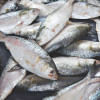
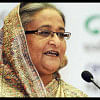
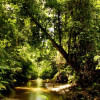


Comments